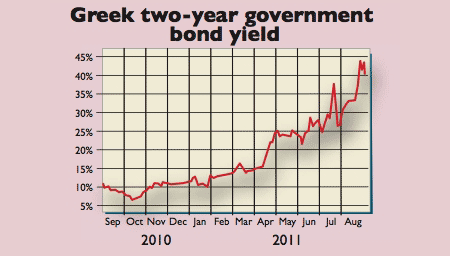
The news from Europe over the last few days has done nothing to shore up confidence that the debt crisis can be solved. The Greek government announced that growth is likely to shrink faster than originally anticipated this year, so the budget deficit may fall to only 8%-8.5% of GDP rather than the 7.6% target. The squabbles over the second Greek rescue package continued. Greek bond yields spiralled again, with one- and two-year rates reaching 60% and 45% respectively.
Demand for Italian ten-year debt, in the country’s first debt auction since the European Central Bank began to prop up Italian paper, proved tepid. The Italian government tinkered with its austerity package. It scrapped a wealth tax and says it plans to put a revised set of measures to a vote in parliament in mid-September.
What the commentators said
European policymakers are “showing comical, if destructive, disagreement”, said James Saft on Reuters.com. Finland’s demand for collateral before it pays for its part of the second Greek rescue package has triggered “a round of ‘me too’ demands” from smaller eurozone states. This is starting to look like “infighting among the creditors in a bankruptcy” rather than a rescue.
Then there are German domestic divisions to worry about. Chancellor Angela Merkel’s attempt to gain parliamentary approval for the promised increase to the European rescue fund next week is being hampered by dissent from her governing coalition. It’s now “not at all sure” that the Greek rescue will go through, said Hamish McRae in The Independent. That in turn raises the spectre of a default in the near future, which would “put a huge dent” in the balance sheets of Europe’s undercapitalised banks, noted Alen Mattich in The Wall Street Journal. That could lead to another banking crisis.
As for Italy, not only does it look as though the austerity package is being watered down, but the Bank of Italy has warned that it should include measures to boost growth. Stagnation will merely slow the decrease in the overall debt load, it warned. The wider issue is that Europe’s politicians seem to think they can hoodwink the markets, said Irwin Stelzer in The Wall Street Journal. It’s not just that Italy has “refused to undertake the structural reforms” required to end stagnation. Greece has promised to privatise much of the economy, but hasn’t sold “any significant assets yet”. France has signed up to Germany’s call for balanced budgets, yet it hasn’t balanced its own budget for 35 years. “Markets are appropriately… cynical.” With Europe’s debt rescue plans “turning into a train wreck”, said Saft, expect an “unsettling September”. (For more, see this week’s cover story: How to play the next stage of the eurozone crisis.)